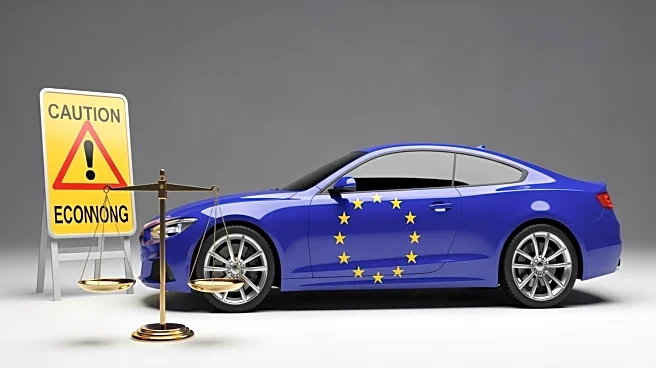What's Happening?
European cities, including Paris, Brussels, and Amsterdam, along with over 75 civil society organizations, have expressed concerns over a trade deal between the European Union (EU) and the United States.
The deal, agreed upon over the summer, suggests mutual recognition of each other's automobile standards. The signatories argue that adopting lower US vehicle standards could undermine the EU's leadership in road safety, public health, climate policy, and competitiveness. EU vehicle safety regulations have contributed to a 36% reduction in road deaths since 2010, whereas the US has seen a 30% increase in road deaths during the same period. The EU's stringent requirements for technologies like pedestrian protection and automated emergency braking have been pivotal in enhancing road safety.
Why It's Important?
The potential acceptance of US vehicle standards poses significant risks to European road safety and public health. The EU's current standards have been instrumental in reducing road fatalities and improving air quality. Lowering these standards could lead to increased exposure to pollutants, affecting public health with conditions like asthma and cancer. Economically, the shift could result in job losses within the EU's automotive industry, as production may move to US plants. This change could also impact the EU's automotive supply chain, threatening the region's economic stability and competitiveness.
What's Next?
The European Commission is working to tighten Individual Vehicle Approval (IVA) processes to prevent oversized US vehicles from entering the EU market without meeting safety and environmental standards. The signatories urge EU lawmakers to oppose the acceptance of lower US standards and to publicly affirm the non-negotiability of EU vehicle standards. This opposition could lead to further negotiations or amendments to the trade deal to ensure the protection of EU standards.
Beyond the Headlines
Accepting lower US vehicle standards could have long-term implications for the EU's environmental policies and its commitment to reducing carbon emissions. The move could also affect the EU's global reputation as a leader in sustainable and safe automotive practices. Additionally, the decision could influence future trade negotiations and relationships between the EU and other global partners.









